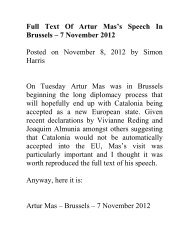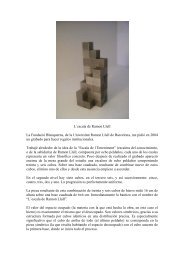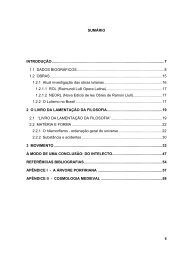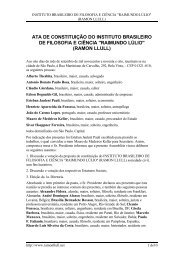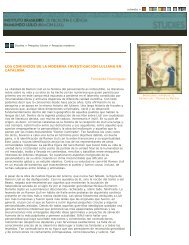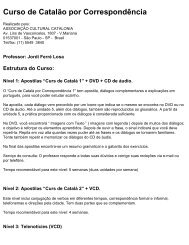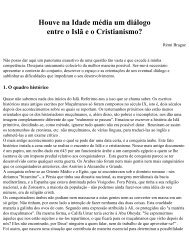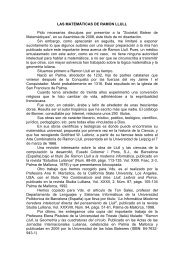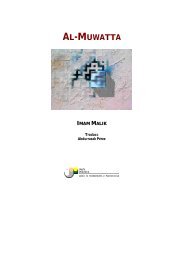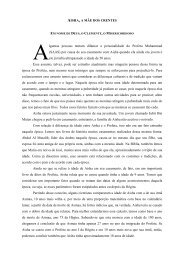Create successful ePaper yourself
Turn your PDF publications into a flip-book with our unique Google optimized e-Paper software.
in the experience of gratuity means to make possible a future where the opening to the<br />
radical novelty of the human life that encloses forgiveness becomes reality.<br />
This gratuity, which is found in the root of the term forgiveness, asks not only to<br />
be introduced into the children’s world, but also to be kept in the adult’s world. Today<br />
we live immersed in a world where, much too frequently, all reference to gratuity is<br />
banned. Currently, the «condition of the modern man» (H. Arendt) is ruled by technique<br />
and by the (new) technologies as a way of life adopted as language, the language of<br />
logic, a language apt for science, but radically insufficient for the development of the<br />
humanity of men and women of our time. The reduction of the word to a sign and of the<br />
sign to its logical meaning, forgetting or despising the symbolic value of every human<br />
word, admits the dehumanization and the technicalization (the «logicalization») of all<br />
that is human, making the human being incapable of language (symbolic), incapable of<br />
the human and humanizing word. The consequences of the establishment of the truth as<br />
identity between thought and language, that Parmenides put in the origin of Greek<br />
thought (metaphysical), that is, the principle of identity (which approximates briefly to<br />
formulating a=a), we now see them developing with great amplitude, and in such a way<br />
that they reestablish —and are commercialized— as the form of independent life of the<br />
times to come. The reduction of the world and of language to logic identity determines<br />
us as objects of the same technique, with no need or possibility of having a meaning, of<br />
re-creating it again. We find ourselves immersed in a nihilistic world from which it<br />
becomes difficult to free ourselves, precisely because of it character, necessarily<br />
globalizing and all embracing. The consequences of these nihilistic times we live in<br />
now, are of an incalculable reach, so far. Currently, to make it apt for gratuity, we must<br />
face repeatedly the question in search of truth, to face truth itself, that which philosophy<br />
(to say it according to our Western tradition) has tried to do since the beginnings. We<br />
must again situate the fundamental role of philosophy, of every form of comprehension<br />
of truth. In a recent article in Revista Catalana de Teologia , Dr. Ignasi Boada,<br />
dialoging with Heidegger, wrote:<br />
The word filosofiva thought in the scope of essential thought, acquires a quite<br />
different dimension and significance from that of a simple academic occupation to<br />
which we can dedicate ourselves or not, aiming our more or less «subjective»<br />
preferences or our tastes, without this dedication or not, having greater consequences.<br />
We can chose «studying» Philosophy, Journalism, Law or Political Sciences and it may<br />
seem to us that | what is at stake is simply the activity in which we will «occupy»<br />
ourselves in the future. It is normal to think that the decision has to depend upon our<br />
tastes. That is not so: in filosofiva something else is at stake, aside from the<br />
expression of certain «subjective» preferences. Neither is it an academic discipline<br />
having as a «goal» a comprehension and a description of certain abstract concepts or of<br />
certain methods of knowledge. In filosofiva something essential occurs, because it<br />
constitutes a human means of answering the fact of «being called by its being» […].<br />
The characteristic gesture of the thought that thinks is not so much the question that<br />
inclines towards the system, as the concentrated listening; therefore, there is no thought<br />
that thinks immediately, but only after a patient preparation. 38<br />
38 Ignasi BOADA, «Heidegger lector de Parmènides: Repensar la veritat», Revista Catalana de Teologia<br />
XXIV/1 (1999) 184-185.<br />
50<br />
18



